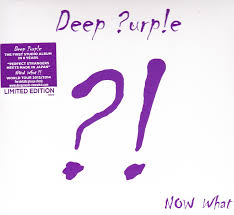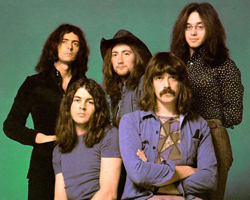Hell to Pay (English)
Take pity on two-tone Eddie
His hair was never right
He used to be cool with a glint in his eye
But he lost it overnight
The spinning world is changing things are rearranging
But Eddie says to me
Nothing wrong with the way it was
That's way it's meant to be
Up the revolution
We're all prepared to die
Up the revolution
That was the battle cry
There's gonna be hell
Hell to pay
There's gonna be hell
Hell to pay
Eddie was a die-hard rebel
In the good old days of way back when
A cigarette was cool and all the kids in school
Could read and count to ten
Everyone said he had a future bright
Of that there was no doubt
He never could make us understand
What the rebellion was all about
Up the revolution
We're all prepared to die
Up the revolution
That was the battle cry
There's gonna be hell
Hell to pay
There's gonna be hell
Hell to pay
Two-tone Eddie drew up battle plans
For making love not war
Everybody laughed at the fighting in the street
From behind a guarded door
It came to nothing when it all went down
And the band began to play
Another plan, put your head in the sand
Live to fight another day
Up the revolution
We're all prepared to die
Up the revolution
That was our battle cry
There's gonna be hell
Hell to pay
There's gonna be hell
Hell to pay[1]
[1] Eddie was an armchair revolutionary; always whipping us into a frenzy of anti-establishment activity. When I say activity it was really just animated talk, fuelled by alcohol and the need to impress our fellow revolutionaries. Eddie was 'All talk and no trousers'. At the first sign of trouble he'd be under the table or out the door like the proverbial rat up a drainpipe. But he had a Che Guevara T-shirt, a wispy moustache and a flinty stare that gave him a manic edge over his impressionable coterie. His hair was never right though, I think his 'two-tone' soubriquet came from the comb-over; his pale skull showed through in stripes beneath his greasy barnet (Barnet Fair = Hair; rhyming slang) as the evenings wore on. (Ian Gillan)
| Uploaded by | Répás Norbert |
| Publisher | earMusic, Edel |
| Source of the quotation | Now What?!, Airey, Gillan, Glover, Morse, Paice / metrolyrics.com |
| Publication date | 26. April 2013 |
 |
|
Pokoli számadás (Hungarian)
Könyörüljetek kétszínű Edén
Haja sosem volt egy ékszer
Szókimondó szemében csillolgás
De azt elvesztette éjjel
Dolgok alakulnak, forgó világ változik
De Ede hozzám beszél
Nincs abban rossz, ahogy volt
Így van ez rendjén
Éljen a forradalom
Halni készek vagyunk
Éljen a forradalom
Ez volt harci hangunk
Közeleg a pokol
Pokoli számadás
Közeleg a pokol
Pokoli számadás
Ádáz lázadó volt Ede
Jó öreg napokon anno hajdanán
Menő volt a cigi és minden diák
Olvasott sőt tízig számolt nagy lazán
Úgy hitte mindenki, hogy övé a jövő
Ez nem volt kétségbe vonható
Sohasem érttette meg velünk
Lázadás miért oly bombajó.
Éljen a forradalom
Halni készek vagyunk
Éljen a forradalom
Így szólt hadi zajunk
Közeleg a pokol
Pokoli számadás
Közeleg a pokol
Pokoli számadás
Kétszínű Ede harci terveit szőtte
Béke és szerelem körül
Utcai harcokon nevetett mindenki
Őrzött ajtók mögül
Nem volt füstje se lángja, mikor ez történt
S a zenekar játszani kezdett
Terv változott, fejed nyomd homokba
Másnap harcában légy edzett
Éljen a forradalom
Halni készek vagyunk
Éljen a forradalom
Ez volt hadi zajunk
Közeleg a pokol
Pokoli számadás
Közeleg a pokol
Pokoli számadás[1]
[1] Ede egy szalonforradalmár volt; folyamatosan az intézmények elleni serénység őrületébe kergetett minket. Amikor serénységről szólok tudni kell, hogy az csak tettetett beszéd volt, melyet alkohol táplált és forradalmi kollégákra gyakorolt benyomás szükségessége szított. Ede olyan se füle se farka jellem volt. Balhé első jelére asztal alá bújt vagy ahogy a közmondás mondja "köd előttem köd utánam" kirohant az ajtón. Egy Che Guevara trikót viselt, bajusza leheletfinom, tekintete szívtelen volt, mely gyülekezetével szemben mániás élű fölényt biztosított neki. Mindig kócos volt. Azt hiszem hajfésülete ihlette a "kétszínű" becenevét, t.i. ahogy telt az este sápadt koponyája egyre jobban csillogott zsíros barnetja (Barnet Fair = haj, szleng) alól. (Ian Gillan)
|





